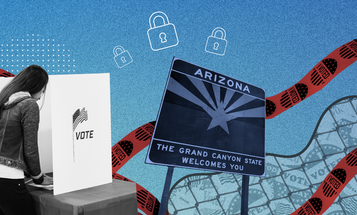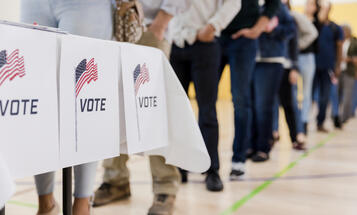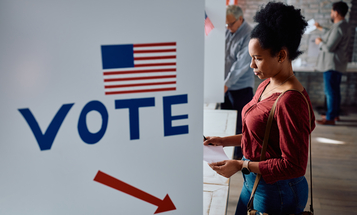
Voter Intimidation in 2012. And How to Stop It Next Time
 In early October, billboards began appearing — 85 in the Milwaukee area and 30 each in Cleveland and Columbus — saying "Voter Fraud is a Felony!" punishable by up to 3 1/2 years in prison and fines of $10,000. The billboards only appeared in low-income, minority areas.
In early October, billboards began appearing — 85 in the Milwaukee area and 30 each in Cleveland and Columbus — saying "Voter Fraud is a Felony!" punishable by up to 3 1/2 years in prison and fines of $10,000. The billboards only appeared in low-income, minority areas.
After Demos and other voting rights advocates attacked the billboards as blatantly meant to intimidate, Clear Channel Outdoor took them down. Even better, they were replaced by billboards in Cleveland, Columbus, Cincinnati, and Milwaukee with signs that urged residents to “Stand Up and Have Your Say – VOTE.” A second set of billboards reminded voters that “When We Vote, We Are All Equal.” The pro-voter billboards also included the Election Protection coalition’s voter hotline number, 1-866-OUR-VOTE.
In addition to the challenges in North Carolina, there were other attempts to deter voters in that state during early voting. The Board of Election put out a memo, stating “This office is also receiving reports of voters purposefully being given misinformation about the 2012 General Election.” For example:
- Voters are being told that they can vote by phone or online
- Voters are being told that if they are affiliated with a certain political party that they must vote on Wednesday, November 7th instead of Tuesday, November 6th.
- Voters are being visited by individuals who are misrepresenting themselves as county board of elections officials who are charged with conducting voter surveys
- Voters who have already voted are receiving phone calls advising them that their absentee ballot is already in the mail.
- Voters are being told that if they have an outstanding ticket, they cannot vote
- Voters are receiving misinformation that they are required to re‐register each time they vote.
Some voters, primarily African American, in the swing states of Florida, North Carolina and Virginia received phones calls for weeks erroneously telling them they could vote by phone.
Phoenix NBC Channel 12 reported that Republican Jeff Flake's U.S. Senate campaign made robo-calls over the weekend to registered Democrats and gave them the wrong polling place location.
Registration forms were also a route used to disenfranchise some voters.
A voter registration worker associated with the Republican Party was charged with voter registration fraud for throwing filled out registration forms in a garbage bin. His arrest came just weeks after the Republican National Committee said it had cut ties with his employer, Nathan Sproul, after several Florida counties complained that Sproul’s firm had submitted hundreds of voter registration forms with irregularities or missing information.
In addition, disturbingly both the Romney Campaign and True the Vote affiliates were found to be giving wrong information to people they were training to work the polls, such as with regard to voter identification requirements and ex-felon voting rights.
Deceptive practices meant to burden a person’s right to vote should be made a crime. The Voting Rights Act already prohibits intimidation, threats, or coercion with respect to the exercise of the right to vote. However, we need more specific legal protections against insidious practices such as making calls telling people they can vote by phone if they have been long-time voters, and pretending to record their vote by phone; voters being told that if they have an outstanding traffic ticket, or unpaid child support obligations, they cannot vote and may even be arrested at the polling place; and calls telling voters that their polling station has moved when it hasn’t.
Federal law should enable the Justice Department to prosecute people for these types of deceptive practices, and give voters who have been harmed the right to sue to stop the deceptive practices.



